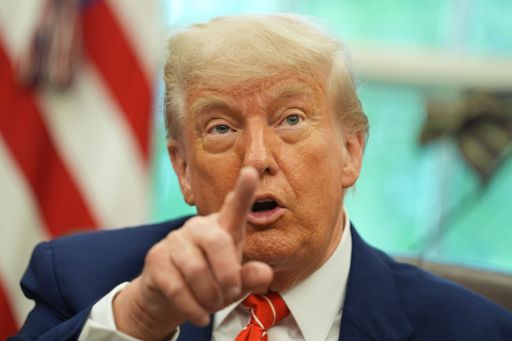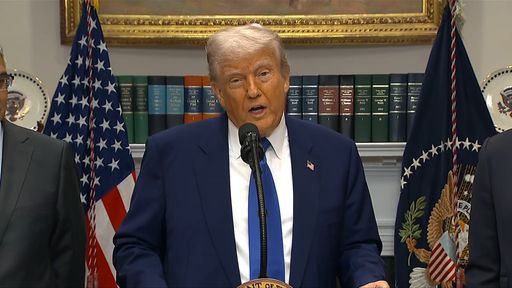Former US President Bill Clinton once called Kashmir a "nuclear flashpoint" and dubbed the ceasefire line that splits the picturesque Himalayan region as "the most dangerous place in the world".
Last week, when New Delhi and Islamabad – which administer India-administered Kashmir and Pakistan-administered Kashmir but claim the region in its entirety – exchanged missile and drone strikes in each other's cities, the possibility of a nuclear conflict seemed real.
Tensions only decreased following US intervention, prompted by what US media reported was an "alarming intelligence" from the region.
The New York Times and other experts reported that this intervention occurred after an Indian missile struck Pakistan's Nur Khan Airbase in Rawalpindi.
The airbase serves as a vital transport and refuelling centre for Pakistan's Air Force. It's situated roughly 10 km from the Strategic Plans Division, which manages Pakistan's 170 nuclear warheads.
Eventually, the crisis subsided after US President Donald Trump engaged his team with the leaders of both rivals, announced a ceasefire, and expressed willingness to mediate the Kashmir dispute with both India and Pakistan.
Analysts suggest Trump's Kashmir initiative has spotlighted the disputed region once again.
"Kashmir is a question of self-determination — a basic human right denied to millions," Javed Hafiz, a former Pakistani ambassador, told TRT World.
Hafiz likened Kashmir to Palestine — a conflict that the world prefers to ignore "until violence forces it back into the spotlight."
"It's an international dispute that is constantly sidelined, buried under diplomatic caution," he said.

President Trump hails the US-brokered ceasefire between India and Pakistan, saying he will now work with leaders of both countries to resolve the Kashmir dispute.
'It's a shame'
But Trump may have resurrected it.
Some two weeks ago, Trump expressed his hope that both parties would discover a resolution to de-escalate tensions, describing Kashmir as an unresolved dispute spanning 1,500 years.
US Vice President JD Vance even stated that the US has no role in resolving the India-Pakistan crisis that arose following the killing of 26 Indian tourists in India-administered Kashmir on April 22 by suspected rebels.
India, viewing Kashmir as a bilateral matter with Pakistan, appeared to be satisfied by Trump's lax approach to the crisis.
On the night of May 6-7, however, India launched missile attacks at multiple sites in Pakistan and Pakistan-administered Kashmir, killing and wounding dozens of civilians, some of them children.
"It's a shame, we just heard about it," Trump reacted at the White House on the next day. "I guess people knew something was going to happen based on a little bit of the past. They've been fighting for a long time."
Soon, India and Pakistan traded heavy fire that continued for four straight days in their worst conflict in more than 25 years, launching missiles and drones at each other's military bases and leaving dozens of people, mostly civilians, dead.
Pakistan said it shot down five Indian aircraft, including three French-made Rafale jets.
India acknowledged combat losses but is discreet regarding the fate of its aircraft.
Independent weapons experts and US and French officials say Pakistan may have shot down at least two Rafale jets using Chinese J-10C fighter aircraft.
As the situation risked spiralling, the US President's team contacted both leaders and brokered a ceasefire, confirmed by New Delhi and Islamabad.

He also says the United States is ready to help India and Pakistan with trade, adding that trade is a major reason they stopped fighting.
Trump did what India was wary of
"After a long night of talks mediated by the United States, I am pleased to announce that India and Pakistan have agreed to a FULL AND IMMEDIATE CEASEFIRE. Congratulations to both Countries on using Common Sense and Great Intelligence," Trump said on Truth Social.
US Secretary of State Marco Rubio’s went a step further in his statement and claimed India and Pakistan had consented to "start talks on a broad set of issues at a neutral site."
Trump returned to the conversation once more, saying in another post that, "I will work with you both to see if, after a 'thousand years,' a solution can be arrived at concerning Kashmir."
In all this, Trump did what India was wary of.
He has waded into the Kashmir crisis and announced his willingness to mediate the conflict, unresolved since 1947.
India views it as a bilateral matter and has consistently opposed international intervention.
Pakistan maintains that Kashmir is an internationally recognised dispute and must be resolved in accordance with the relevant UN resolutions and the wishes of the Kashmiri people.
South Asia analyst Michael Kugelman told the AP news agency that Trump's offer is a "diplomatic coup for Pakistan."
"A core and consistent Pakistani foreign policy goal is to internationalise the Kashmir issue. And that's exactly what has happened here, much to the chagrin of an Indian government that takes a rigid position that the issue is settled and there’s nothing to discuss," he said.
Kashmir remains a long-standing flashpoint, contested by two nuclear powers since the British vacated the sub-continent.
Since 1989, rebel groups have fought some half a million Indian troops for the territory to become independent or unite with Pakistan, a goal most of the region's Muslim majority population support.
India blames Pakistan for backing what it calls "terrorism", a charge Islamabad denies.
Pakistan states that it only supports the demand of Kashmiris for a UN-sponsored plebiscite in the region "politically, morally and diplomatically."
Praveen Donthi, senior analyst with the International Crisis Group, told AP news agency that "the two countries have to give Kashmiris a chair at the table of negotiations for a more durable peace process and faster resolution of the problem."
He said Kashmiris have lost more lives due to the conflict than government forces on both sides.
"They always have more to lose … in the absence of mechanisms that resolve the Kashmir dispute," Donthi added.
'These cycles of violence will continue'
Will Trump help break the current status quo over Kashmir?
Aydin Guven, a South Asia researcher and doctoral candidate at George Mason University, told TRT World that the US-brokered truce may have brought a momentary calm, but it has not addressed the root causes of the conflict.
"Washington's goal is to prevent a larger war, not to resolve the Kashmir issue itself," said Guven, citing Washington’s growing ties with New Delhi.
"The US wants stability, but that doesn't mean it will take sides."
But Hafiz warned Kashmir cannot be left unresolved for a long time.
"Until the world takes Kashmir seriously as an international issue, these cycles of violence will continue," Hafiz said, warning a new bout of fighting could flare up again with a much greater intensity.

.jpg?width=256&format=webp&quality=80)




.jpg?width=256&format=webp&quality=80)








